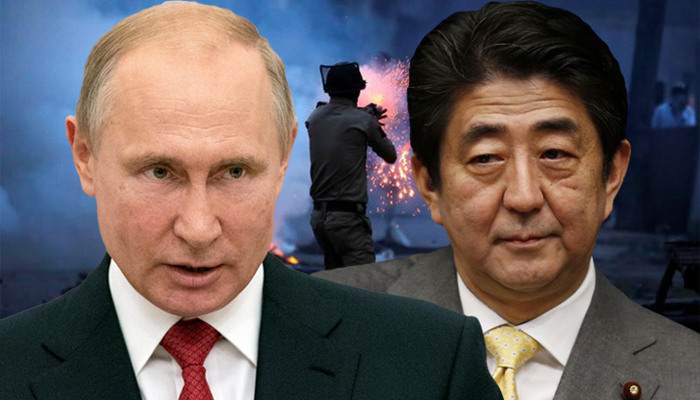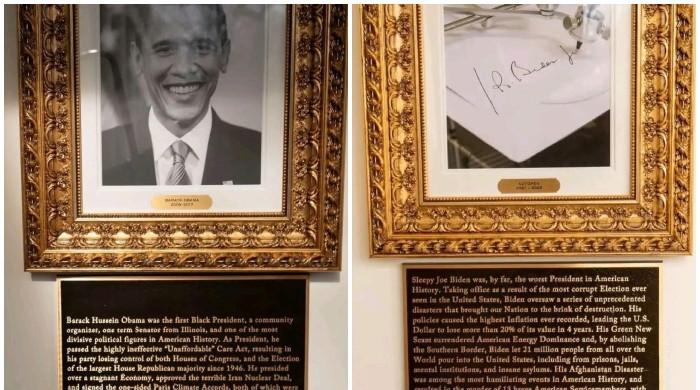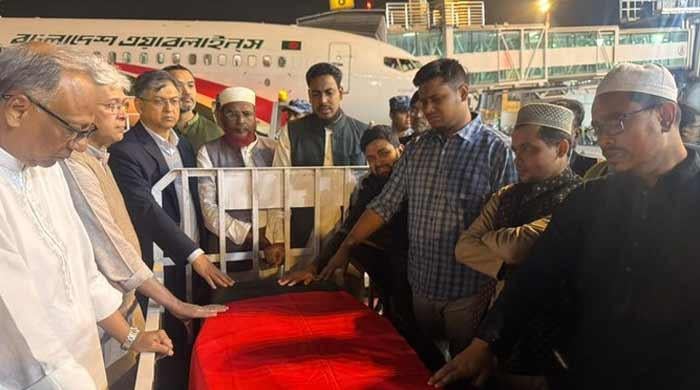Russia, Japan resolving Kuril Islands' dispute may set example for Kashmir conflict
The Kashmir issue would be resolved the day both Delhi and Islamabad realize that the absence of a peace treaty is an abnormal situation
October 08, 2018

A decade after resolving the Sino-Russian border dispute, Vladimir Putin is making every possible effort to settle the long-lingering territorial discord with Japan. Although Moscow and Tokyo have yet to work out the modalities, he has gone as far as to even set a date to fix the Kuril Islands conflict without any preconditions.
His desperation to sign the permanent peace treaty before the end of this year is a classic example to follow in attempting to resolve the Kashmir conflict.
However challenging the task, both leaders are in a position to make bold decisions. Putin, only seven months ago, was elected for the fourth time in office, while Japan's Shinzo Abe has the distinction of serving as the third-longest serving premier and has been, yet again, elected the ruling party's leader.
Knowing full well that the history is on his side, a realistic Abe told the United Nations General Assembly (UNGA) that the territorial issue must be resolved and a peace treaty signed. He says: "If we don’t do it now, then when?" and "If we don’t do it, then who will?"
The bone of contention is the strategically- and economically-important Islands that separate the Sea of Okhotsk and make a ring of fire in the Pacific. Stretching from the Russian Kamchatka Peninsula to the Japanese island of Hokkaido, these 56 Kuril Islands make a 1300-kilometre outpost.
Since the Second World War, Russia has extended its 1855 border from Urup to Habomai and Kunashir, and changed the demography by expelling most of the Japanese inhabitants with her own settlers. Under the Treaty of San Francisco, Tokyo once renounced its claims to these territories only to reclaim the Southern parts years later.
While both sides have tried to sort out the issue, sticking to the stated positions has resulted in a zero-sum game. Putin offered to return the southernmost Shikotan and Habomai islands only if Japan would drop its claims to the rest of the Kurils.
Japan halfheartedly shunned the deal and maintained its claim to Kunashir, as well as Iturup. The reason was simple; it knew that the United States would take such a concession as a sign of weakness and gobble up Okinawa on the other side of the border.
Okinawa is under Washington's occupation since the WWII and has played a crucial role in attacking the Koreas, Vietnam, Afghanistan, and Iraq. It also serves as a check on China.
Therefore, in order to reach a mutually acceptable solution, both countries would not only have to adjust borders in an out of the box approach but also consider the United States' response.
Diplomatically, Russia is more experienced to make such a deal. After building trust through 40 years of overtures, Moscow has successfully negotiated the border dispute with Beijing on the basis of give-and-take. Rhetorically, Putin says he does not trade territories but, on the negotiating table, he has handed over Tarabarov Island and half of the Bolshoi Ussuriysky Island to China.
In a wise diplomatic move, he ceded 174 kilometres to get the Chinese endorsement on half of its area. By making this deal, the Communist allies-turned-rivals have forged a relationship that helps them concentrate on the significant strategic and economic issues of local and global importance.
Can Putin pursue peace with Japan in the same spirit and can Abe afford to follow President Xi of China? As a matter of fact, by solving one of the longest territorial disputes in East Asia, both countries will emerge economically stronger and reduce Chinese domination of the region.
Yet, the question remains: at what cost?
Strategically, these southern territories provide the Russian fleet access to the Pacific Ocean and her submarines to transit open ocean underwater round the year. Handing this region over to the Japanese means China would also lose one of the few gateways to the Pacific.
These Russian lighthouses are also a volcanic archipelago, which is a rich source of geothermal energy, hydrocarbon deposits, gold, titanium, and rhenium. The waters off the Southern Kurils also serve $5 billion worth of seafood annually.
Putin knows well that Abe would not agree to something that his father Shintaro rejected as a foreign minister. But, at the same time, Shinzo would walk the extra mile to make peace.
The real question is: what else Putin can offer other than two southern Islands? Shared sovereignty is out of the question.
With the other two disputed Islands comprising 93% of the land mass, can they help Russia give some leverage to Japan? The expelled Japanese have an emotional attachment to their birthplace and,m of course, the graveyards of their ancestors. An agreement could be reached to make the other two Islands freely open to them, with due compensation to leave their ancestral land that may help heal their wounds.
As these Islands are also a matter of dignity, Moscow, to make the deal more acceptable, could help Tokyo by supporting the counter-CPEC project. Even if everything goes right, a lot depends on the outcome of the Abe-Trump back-to-back meetings held a few days ago, during the UNGA, in New York.
Considering that both sides have the will and determination, it would not take long before the Russia-Japan peace pact becomes a reality.
While the Kurils and Kashmir issues have entirely different origins, South Asian neighbours India and Pakistan can learn a lot by the possible example being set by Russia and Japan.
Mature minds in Moscow and Tokyo are showing flexibility to pursue peace by setting a timeline. They are stepping out of their long-held positions and also giving a face-saving value to each other. Here, we believe that the rigidity of sticking to a 70-year-old stance would prevail.
The Kashmir issue would be resolved the day both Delhi and Islamabad realize that the absence of a peace treaty is an abnormal situation. By looking at the history and pace of evolution in this part of the world, one must be sure that we will be long content with bravery and sacrifices than sanity.









